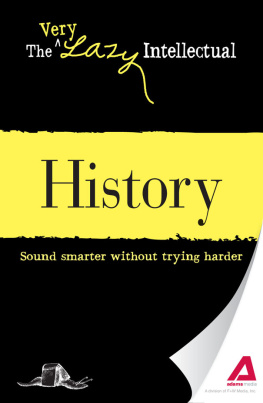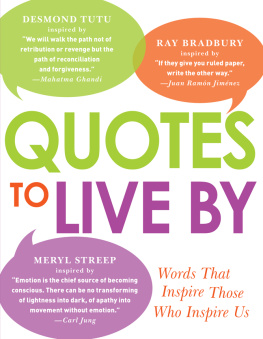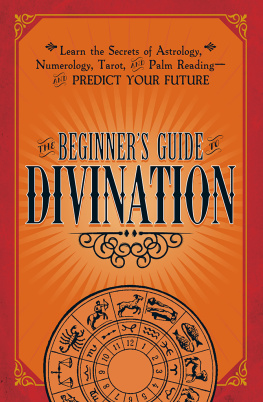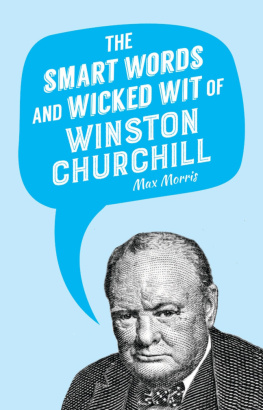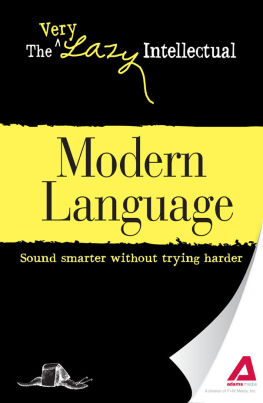The Very Lazy Intellectual
History
Sound smarter without trying harder
Adams Media, a division of F+W Media, Inc.
Avon, Massachusetts
Contents
Introduction
If we were to look up the term lazy in a dictionary, we might expect to find some unflattering connotations. Lets skip over such definitions as adverse or resistant to work, slothful, and sluggish, and adopt a more positive, charitable perspective. If instead we consider lazy as economical or avoiding waste, we get a much better picture of the idea behind The Very Lazy Intellectual series.
This series of books is a set of short, economical references full of the fundamental knowledge you need to know to sound as if you really know something about a particular academic subject. The Very Lazy Intellectual: History lays out the indispensable facts, crucial high points, and fascinating elements of all of the worlds major historical moments to build your knowledge foundation.
Whether you want to refresh your memory of a long-since forgotten course, or merely wish to be able to say something intelligent about medieval Europe or Pre-Columbian America, this book will help. Enjoy the low-effort scholarship of The Very Lazy Intellectual: History.
If youd like to learn more about history, check out The Lazy Intellectual, available in print (978-1-4405-0456-3) and eBook (978-1-4405-0888-2) formats.
Ancient Greece
Greece has had an outsized influence on history, particularly cultural history. Its architecture, art, literature, drama, philosophy, and language are still studied and appreciated as providing the roots for later development in those fields. Greece had established civilizations by the time of the Bronze Age (about 2800 B.C. ), and its extensive coastline meant that new cultures continually migrated to its islands. Poor soil influenced Greeks to turn to the sea for commerce and expansion, and by the sixth century B.C. , Greece had colonies in Italy, France, Spain, and Africa.
Defining Moment
Democracy (Greek for rule of the people) arose in Greek city-states, small autonomous governments in which politically savvy citizens became involved in the making of their laws. While democratic principles did not extend to resident slaves, and most of these early democracies eventually fell before the greater strength of imperial governments, the idea formed the basis of later, better developed, and more enduring political structures.
Greek Gifts
Greece was the scene of much experimentation with government. The many tribes that had settled on Greek islands formed small, independent city-states, and most went through a political evolutionary process in which monarchies became aristocracies, then tyrannies and oligarchies (power of the few), and eventually the idea of democracy was born. Greek city-states were embroiled in conflict such as the Persian Wars (499 to 449 B.C. ) and Peloponnesian War (431 to 404 B.C. ) with only limited cooperation, for much of their history. Despite the toll of war, Greek civilization flourished even if the city-states could not maintain their independence. Their influence spread over much of the Western world to Asia and India under Alexander the Great (356 to 323 B.C. ), king of Macedonia. Having fought with nearly everyone for centuries, the remaining states fell to Roman rule in 146 B.C.
Repeatable Quotable
History is the version of past events that people have decided to agree upon. Napoleon Bonaparte
We still consider ancient Greece as a period in which learning and thought were newly elevated by many intellectuals including Sophocles, Euripides, Socrates, Plato, Aristotle, and Hippocrates. Hellenism, the term for the cultural influence and ideals of ancient, classical Greece, derives from the name Greeks gave themselves.
Fast Fact
Logic and the scientific method are two of Aristotles greatest contributions, but his interests covered many sciences, history, and political and literary theory. His work is vast, yet two-thirds of his original writings may have been lost.
Middle Ages
The Middle Ages is a period in European history that dates roughly from the fall of the Western Roman Empire in the fifth century to the beginning of the Renaissance in the fifteenth century. The Early Middle Ages saw a decline in population as the influence of Rome decayed, unable to protect citizens from increasing barbarian invasions. Many of the improvements that the Roman Empire had introduced, such as water-supply systems, efficient agricultural methods, roads. and shipping routes, fell into disrepair.
While the Middle Ages are sometimes referred to as the Dark Ages and generally considered a period of cultural oppression, ignorance, and the physical suffering of subjugated peasants, this era is now considered to have set the stage for the idea of a modern Europe. Indeed, a period lasting a millennium and undergoing such radical changes in leadership and social pressures must have produced some positives.
The Beginning of the End
Charlemagne (742814) was one such figure to step out of the darkness to shed an uplifting light on the lot of his subjects. As ruler of the Frankish Empire, incorporating much of Western and Central Europe, Charlemagne brought many reforms and standardizations to justice. He also oversaw a cultural revival, sometimes known as the Carolingian Renaissance, that included developments in architecture and the arts and an increase in literacy made possible by his use of a common writing style that allowed for widespread communication.
More dramatic growth occurred during the Central or High Middle Ages as statehoods expanded and consolidated, populations increased, and general economic health improved through greater trade.
Eventually, the period of the Middle Ages gave way to the Renaissance as interest in classical learning and values lifted cultural health throughout Europe. The Renaissance is also the period that saw such important innovations as paper, printing, the compass, and gunpowder.
Defining Moment
While the exact date of incorporation is unclear, Oxford University was founded sometime in the eleventh century and is the oldest surviving university in the English-speaking world. It is now generally considered one of the worlds leading academic institutions.
The Conquest of America
It is believed that the American continents were inhabited by between 70 and 90 million people when Europeans first reached our shores in the fifteenth century. This population, greater than that of Europe at the time, included 30 to 40 million in North America, 11 million in Central America, and another 39 million inhabitants of South America. All were descended from a group or groups who emigrated from Siberia approximately 14,000 years ago and were undoubtedly looking for a more hospitable habitat. They found it in abundance in the Americas and spread quickly throughout the continents.
The Silent Army
One or two hundred years after those first Europeans visited the new world, the indigenous American populations were decimated, reduced by as much as 95 percent, by European diseases against which the natives had no defense. What a concerted and organized military effort would have accomplished only over a long time and at considerable expense and loss of life was achieved with great efficiency by smallpox, measles, influenza, and typhus. The expansion of America might have taken considerably longer had settlers and frontiersmen encountered 20 million hostile natives rather than fewer than 1 million.

